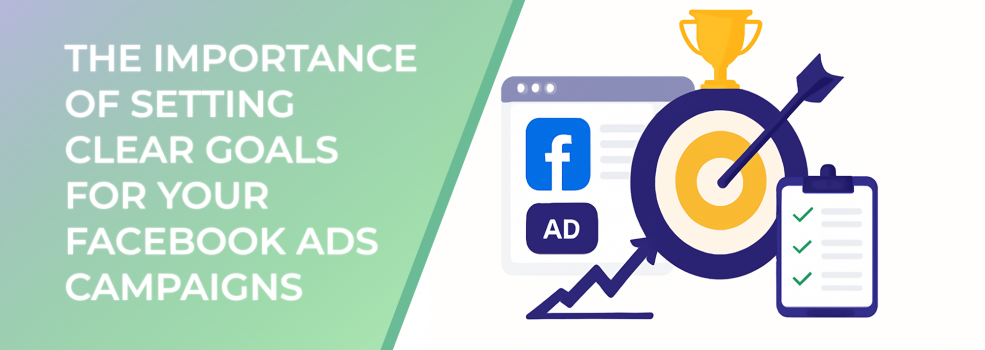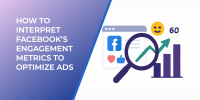Facebook Ads have become an indispensable tool for businesses to reach their audience. However, the success of your Facebook Ads campaigns doesn’t depend solely on how much you spend or how well your creatives look; it largely depends on setting clear and measurable goals.
In this article, we’ll discuss why having specific goals for your Facebook Ads campaigns is crucial and how these goals can drive better results for your business.
Why Clear Goals Matter
Setting clear goals for your Facebook Ads campaigns helps to establish a clear direction for your ad strategy, ensuring that every decision made aligns with the end objectives. Without clear goals, your campaigns might lack focus, which can result in wasted budgets and missed opportunities.
Here’s why setting clear goals is essential:
-
Focused Strategy: With specific objectives, you can tailor your targeting, creative, and budget allocation to align with your campaign’s goals. Whether you’re aiming for brand awareness, lead generation, or sales, your strategies should reflect that.
-
Measurable Success: Clear goals provide benchmarks to measure success. Without goals, you have no way to assess whether your campaign is performing well or if changes are needed.
-
Optimized Budget: When you know exactly what you want to achieve, you can allocate your budget more effectively, ensuring that you’re investing in the areas that will yield the highest returns.
Types of Goals You Can Set for Facebook Ads
Facebook Ads can serve various objectives depending on your business needs. Here are some common campaign goals:
-
Brand Awareness: If you're looking to increase your business’s visibility and reach a broader audience, your goal should be to maximize impressions and reach.
-
Lead Generation: Setting goals to capture leads means focusing on building a qualified list of prospects. This includes optimizing your ads for conversions, using lead forms, or directing users to landing pages.
-
Sales: Directing traffic to your e-commerce site or offering special promotions requires a goal centered around driving conversions and optimizing for return on ad spend (ROAS).
-
Engagement: If your goal is to increase user interaction with your content, you might focus on likes, comments, and shares.
Statistics Supporting the Importance of Clear Goals
Studies show that campaigns with clearly defined goals outperform those without. According to a recent report, 56% of marketers report that setting clear goals is crucial for achieving campaign success.
Statistics show that marketers who set clear goals see significantly higher ROI and success rates in their Facebook Ads campaigns.
Furthermore, businesses that optimize Facebook ads based on specific goals see an average ROI increase of 122% compared to those who run ads without any defined objectives.
How to Set SMART Goals for Your Facebook Ads Campaigns
To get the most out of your campaigns, it’s essential to set SMART goals. SMART goals are:
-
Specific: Your goal should be clear and focused. For instance, instead of "Increase sales," aim for "Increase online sales by 20% over the next 30 days."
-
Measurable: Ensure your goal is quantifiable, so you know when you’ve achieved it.
-
Achievable: Set a realistic target based on your current resources and capabilities.
-
Relevant: Your goal should align with your overall business objectives.
-
Time-bound: Include a timeframe for reaching your goal.
The SMART framework helps structure your Facebook Ads goals, making them more actionable and results-driven
For example, a SMART goal for a Facebook Ads campaign could be: Increase website traffic by 25% in the next three weeks through Facebook Ads targeting users in the U.S. interested in fitness products.
Examples of Goals in Action
-
Lead Enforce Blog Goals: If your goal is to increase traffic to your blog, you could run Facebook Ads with the target objective of getting more clicks to your blog posts like "Factors That Influence the Cost of Facebook Ads". By focusing on traffic-driven goals, your campaigns will help optimize your blog's performance.
-
Optimize Campaigns for Conversions: If you aim for direct sales, consider using "How LeadEnforce Uses Information to Create an Effective Facebook Ad Strategy" as a resource to guide your ads, ensuring your targeting is focused and precise.
Linking Goals with Facebook Ad Analytics
One of the most important aspects of running Facebook Ads is monitoring the results. By tracking key metrics, you can adjust your campaigns accordingly to meet your goals. Utilize Facebook Ads Manager to track:
-
CTR (Click-Through Rate): A critical metric for evaluating engagement.
-
CPC (Cost per Click): Helps in budget optimization.
-
Conversion Rate: Tracks how well your ads drive the desired actions.
With these metrics, you can adjust your strategy in real-time and continue to improve your campaigns.
Conclusion
Clear and well-defined goals are at the heart of successful Facebook Ads campaigns. Whether you’re looking to raise awareness, generate leads, or drive sales, the key to success lies in aligning your ad strategy with your business objectives.
Remember, it’s not just about getting your ad in front of people – it’s about ensuring those people take meaningful actions that contribute to your business growth. Setting specific, measurable, achievable, relevant, and time-bound (SMART) goals ensures your campaigns deliver results.

